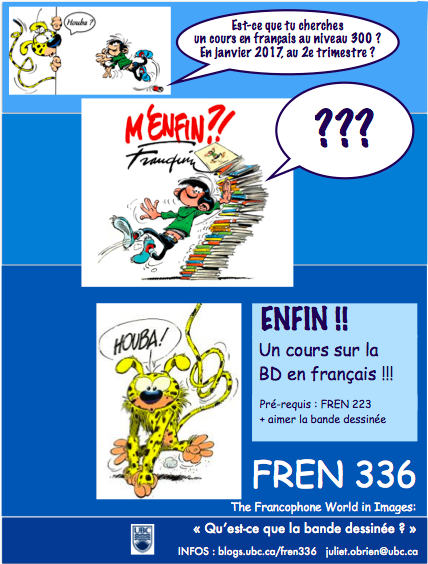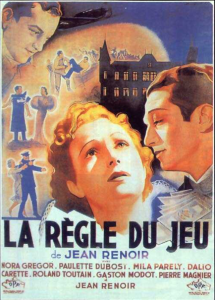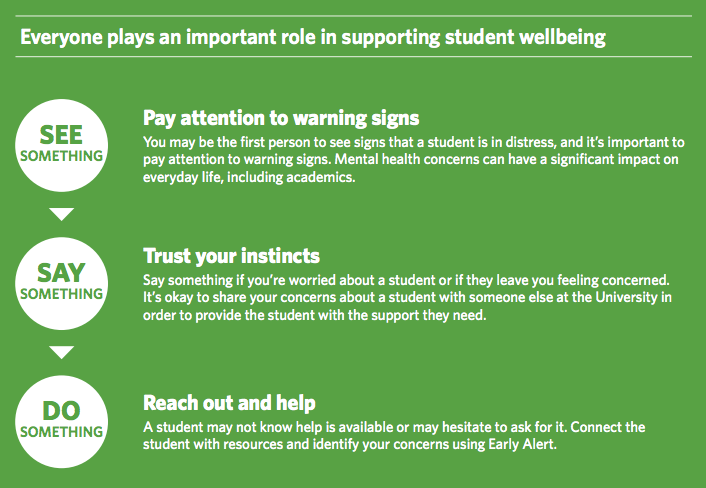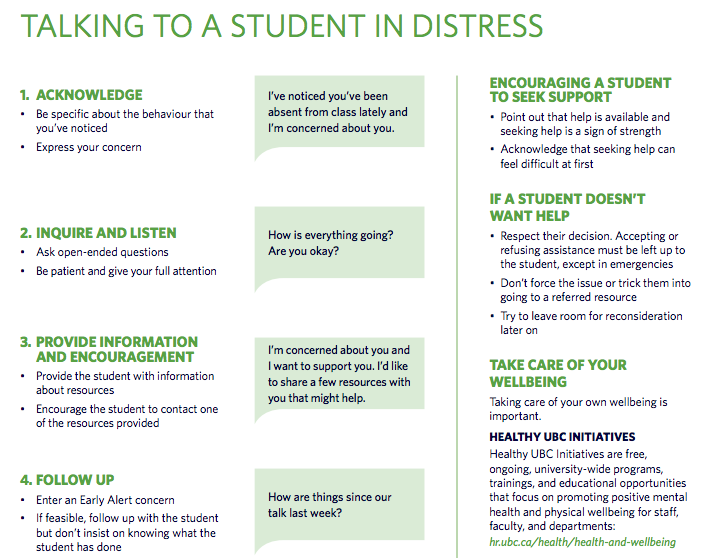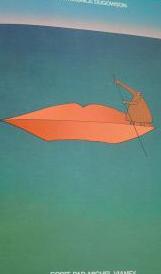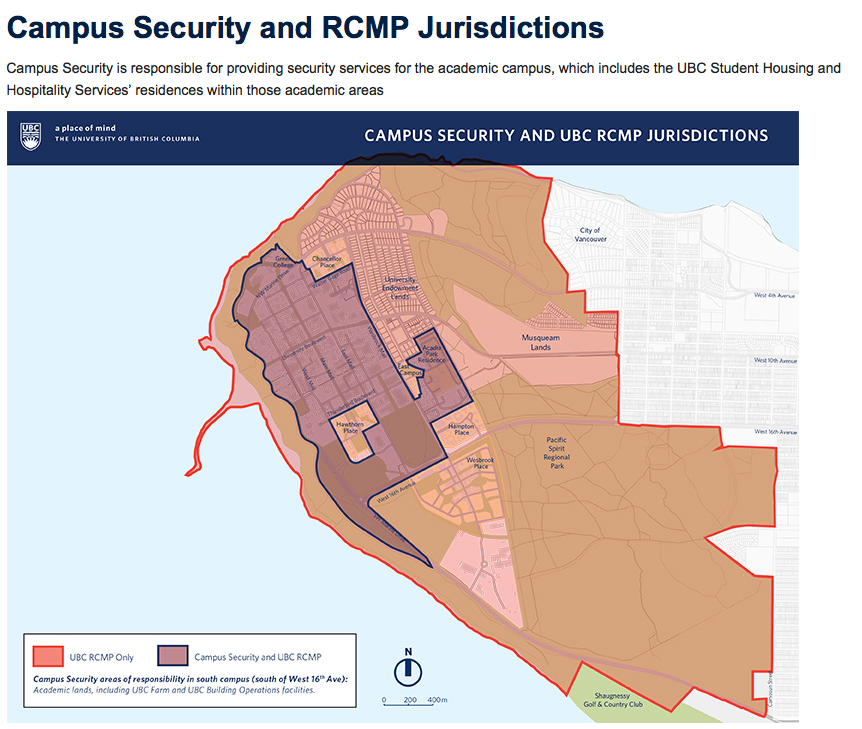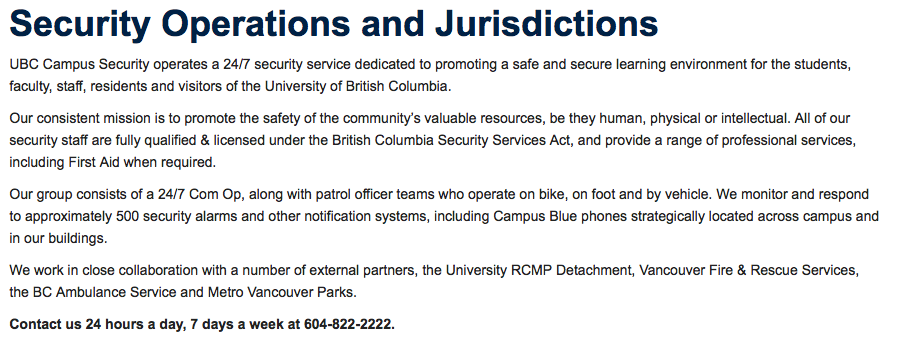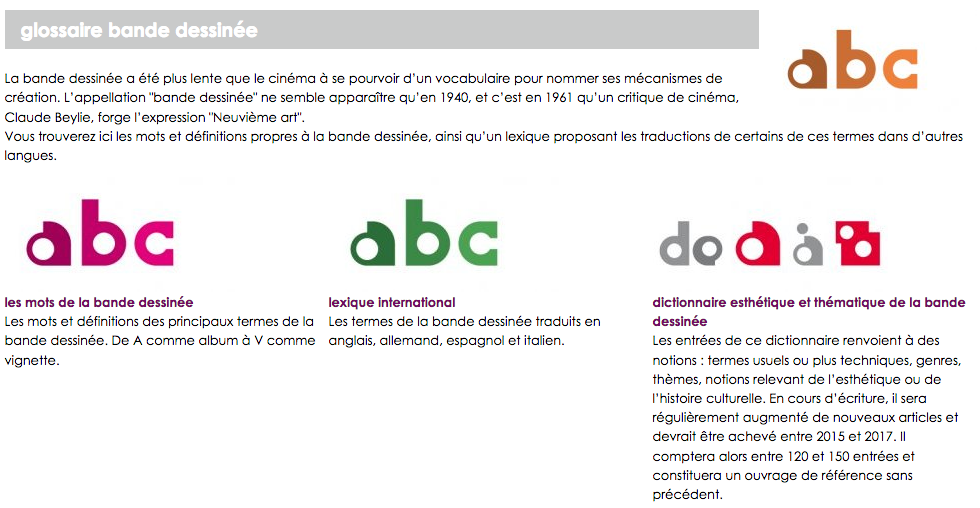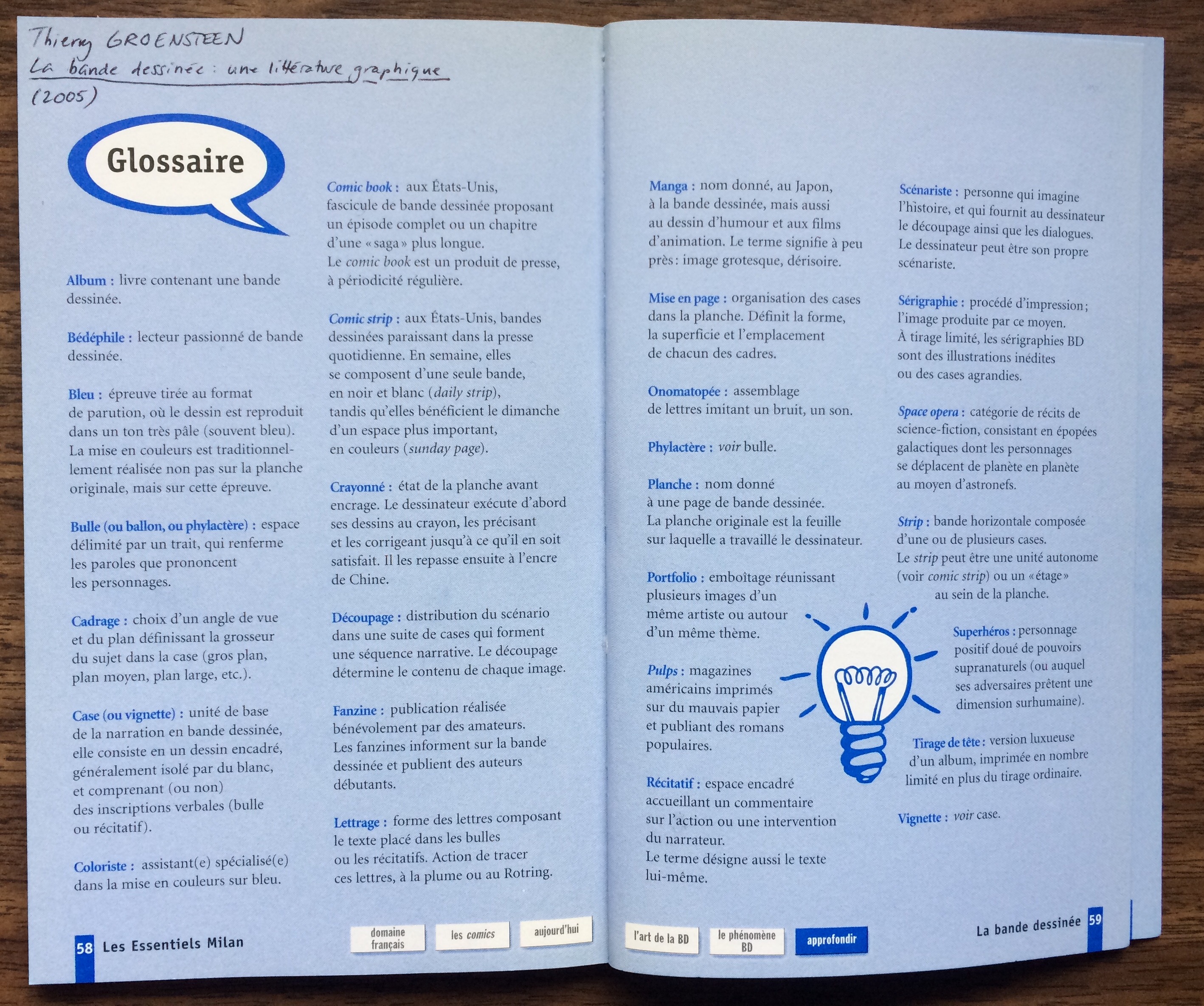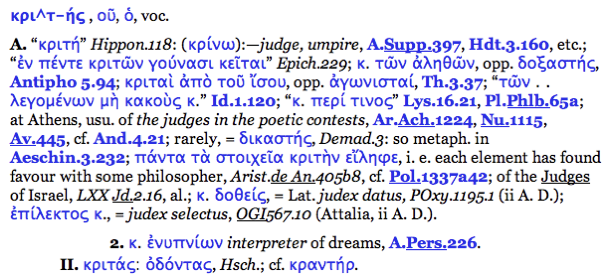Archives de catégorie : Uncategorized
Devenez auteur
Si vous souhaitez avoir votre propre partie du site, à utiliser par example pour le portfolio et/ou le projet final :
1 allez au blogs.ubc.ca + SIGN UP en utilisant votre CWL

2 en suite, vous aurez deux options :
- construire votre propre blogue / site
- contribuer à celui-ci, en tant qu’auteur (« author » = …)

3 si vous souhaitez que je vous ajoute à ce site-ci comme auteur, veuillez bien m’envoyer un e-mail en m’indiquant l’adresse e-mail qui est associé à votre compte CWL et que vous aurez utilisé pour vous inscrire sur UBC Blogs. Je vous enverrai une « invitation » …
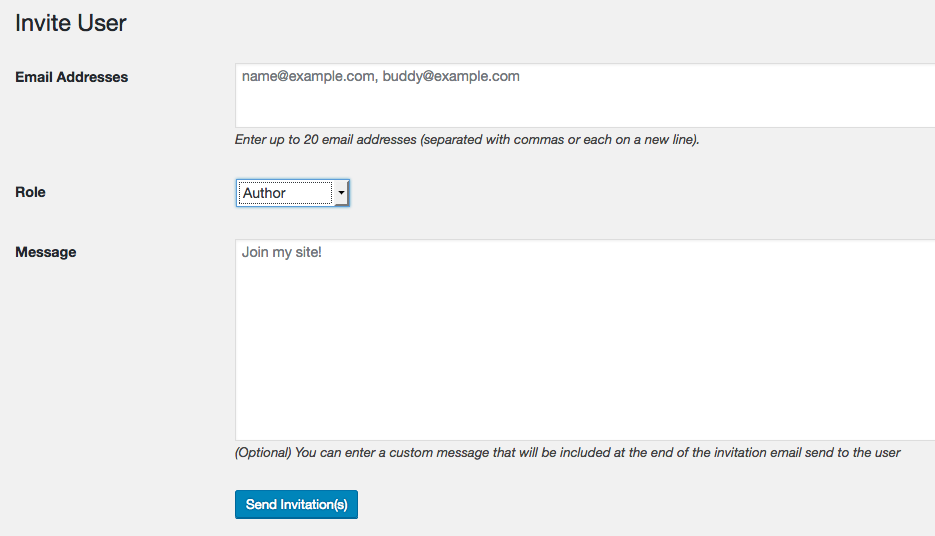
4 vous l’accepterez (il y aura une case à cocher), et voilà : vous êtes « auteur » 
5 en tant qu’auteur, vous pourriez écrire et afficher vos propres articles de blogue (billets, « posts ») et les éditer, rédiger, etc. Vous pourriez aussi ajouter des liens, des fichiers, des images, des vidéos, etc.
6 Privé / mot de passe / public ? Livre à vous, avec quelques conseils :
- Votre prof, en tant qu’ « administrateur » du site, voit tout y compris lees articles « privés »
- C’est un choix à faire à chaque fois, et que vous pouvez changer plus tard
- Si votre portfolio est individuel :
—libre à vous de garder vos articles privés
—ou de les protéger par un mot de passe (qui est juste pour vous)
—ou d’utiliser le mot de passe de la partie « blogue du cours » (afin de donner accès aux étudiants dans le cours mais pas à autrui)
—ou de les rendre publics - Si vous travaillez en groupe :
—NB privé = les autres dans le groupe ne pourront pas voir : utilisez donc plutôt un mot de passe que vous partagerez avec votre groupe
—afin que les étudiants dans notre cours puissent voir (mais pas le grand public) : utilisez le mot de passe de la partie « blogue du cours »
—autre option : le public
7 on adaptera les « categories » pour rassembler votre partie du site dans un seul endroit, en créant une « catégorie » qui est votre prénom et la première lettre de votre nom (ex. Sarah L), ou votre nom, ou vos noms (pour un groupe).
8 veuillez afficher vos articles en utilisant votre « catégorie », cela les regroupera p. ex. à partir des portfolios des étudiants
9 à vous le choix : public / privé / protégé par mot de passe (utile si vous travaillez en groupe)
10 voir aussi : https://blogs.ubc.ca/faq/
11 d’autres options, hébergés en-dehors de l’université :
- Blogger
- Flickr
- Twitter (ex. #fren336 )
- WordPress
- (etc. …)
- ou un simple fichier (doc, ppt, etc.)
12 et si vous voulez, je peux vous aider pendant les heures de bureau :
- lundi 16h – 18h
- mardi 13h – 18h
- sur rendez-vous : lundi, mercredi, ou vendredi matin avant notre cours + mercredi après 16h
SYLLABUS / PROGRAMME
Dr Juliet O’Brien
Heures de bureau : le lundi de 16h à 18h + le mardi de 13h à 18h
Bureau : Buchanan Tower 728
Email : juliet.obrien@ubc.ca
Le service de lecture des messages est assuré en semaine entre 9h et 18h, et le service de réponse est en général dans les 24 heures.
HORAIRE
janvier – avril 2017
lundi, mercredi, et vendredi 11:00 – 11:50, dans la salle SWING 109
PRÉSENTATION DU COURS
—Tic tic tacatacatacata …
—Ouf !… Que se passe-t-il ?????
(Spirou, le 4 janvier 1945)
—M’enfin…
(Gaston Lagaffe)
ENFIN !!
Un cours sur la bande dessinée en français, en tant que BD et en tant qu’expression culturelle francophone !!!
- C’est quoi, la BD ?
- Pourquoi la lit-on ?
- Comment ?
- Comment la bande dessinée s’intègre-t-elle dans la littérature, et plus spécifiquement dans la littérature d’expression française ?
- Quel rôle ce « neuvième art » joue-t-il dans les cultures francophones, dans leurs pratiques sociales, dans la vie et dans l’art de vivre ?
En essayant de répondre à ces questions, dans un travail interactif et collectif, on s’aventurera dans des mondes étranges ; à la découverte aussi des univers de la lecture, du sens, de l’histoire, des histoires, et de l’imaginaire. Le cours est ouvert à toute approche et ne demande aucune expérience préalable en études littéraires ou culturelles : au contraire, on souhaite y attirer et engager des étudiants de milieux aussi divers que possible, afin d’enrichir le cours et nos discussions. La tâche principale du cours sera un projet—créatif, critique, d’analyse, ou de recherche—sur lequel les étudiants travailleront tout au long du trimestre, ponctué de commentaires (en ligne sur le blogue du cours) et de discussions et de présentations en classe. Le cours suivra un format mi-traditionnel, mi-21e siècle : le cours magistral ; le cours interactif, où on commencera avec ue présentation, suite à laquelle ce seront les étudiants au pouvoir: la parole sera donnée aux étudiants ; et la discussion.
Pré-requis obligatoire : aimer la BD ! Les étudiants venant d’autres départements seront très chaleureusement accueillis dans ce cours : toute variété enrichit ce type de cours.
CRÉDITS
3
PRÉ-REQUIS
FREN 223
TEXTES REQUIS
René Goscinny & Albert Uderzo
Astérix chez les Belges
ISBN: 9782012101562
Hergé
Tintin au pays des Soviets
ISBN: 9782203003033
Franquin
Capturez un Marsupilami
ISBN: 9782912536457
LE TRAVAIL
- tout sera en français
- 10% = vous aurez des petits morceaux à écrire toutes les semaines sur le blogue du cours
- 20% = une présentation en classe
—en groupes de +/- quatre
—sur un album, une série, un auteur, un thème/motif, … - 10% = un commentaire
—individuelle
—de longueur moyenne (500-750 mots) sur une planche*
—date de remise : le 5 mars (par e-mail) ou le 6 mars (en classe) - 10% = un portfolio en ligne :
—votre propre collection particulière, choisie, une mini-exposition virtuelle
—individuelle ou en groupe
(ce n’est par forcément le même groupe avec qui vous ferez la présentation en classe)
—peut être une continuation de votre présentation et/ou associé à votre commentaire
—date de remise : le1428 avril - 20% = une œuvre écrite :
—individuelle ou en groupe
(ce n’est par forcément le même groupe avec qui vous ferez la présentation en classe)
—peut être une continuation, un élargissement, ou une élaboration de votre présentation et/ou de votre commentaire
—un projet, une dissertation, un travail de recherche, une BD, un dessin animé, un jeu de société, un jeu informatique (1.500-2.000 mots)*
—date de remise : le 28 avril - 30% = « anti-examen » :
—2,5 heures, à livre ouvert (et avec tout autre matériel que vous voulez apporter avec vous et utiliser)
—(1) 15% = la présentation du travail ci-dessus à vos collègues
—(2) 15% = un commentaire par écrit à propos d’au moins trois autres travaux par d’autres étudiants dans notre cours, en relation aux questions clés du FREN 336
* = en collaboration, si vous le souhaitez, avec le FHIS Writing Centre ; vous pouvez aussi faire ce travail en remettant une vidéo ou un autre type d’enregistrement (et son script)
LE PROGRAMME DÉTAILLÉ / LE CALENDRIER
SEMAINE 1
Du 3 au 6 janvier 2017
- Introduction + sélection d’un mot de passe pour le blogue du cours + Les Cités obscures
- Travail de recherche sur le terrain : trouvez une BD exemplaire + un cas douteux, à la limite et expliquez votre choix (ces exemples peuvent être dans n’importe quelle langue, pas forcément en français) en écrivant un commentaire sur le 1e billet de blogue
- Travaux à rendre : blogue
SEMAINE 2
Du 9 au 13 janvier 2017
- Présentation (informelle) et discussion de vos trouvailles
- Une archéologie de la BD : l’art, la culture, et l’imaginaire pré-BD (surtout médiévale)
- La Belgicité (surtout médiévale)
- Travaux à rendre : blogue
SEMAINE 3
Du 16 au 20 janvier 2017
- Astérix
- (organisation du cours : on formera les groupes pour les présentations)
- Travaux à rendre : blogue
SEMAINE 4
Du 23 au 27 janvier 2017
- Tintin
- Travaux à rendre : blogue
SEMAINE 5
Du 30 janvier au 3 février 2017
- Tintin
- Travaux à rendre : blogue
SEMAINE 6
Du 6 au 10 février 2017
- Marsupilami
- Travaux à rendre : blogue
SEMAINE 7
Du 13 au 17 février 2017
- LUNDI : JOUR FÉRIÉ
- Marsupilami
- Travaux à rendre : blogue
VACANCES !
SEMAINE 8
Du 27 février au 3 mars 2017
- Marsupilami + mini-présentations
- Travaux à rendre : blogue
- Travaux à rendre : le commentaire (fin de semaine : dimanche à minuit par e-mail OU remis en classe, le lundi 6 mars)
SEMAINE 9
Du 6 au 10 mars 2017
- organisation des groupes
- présentations + discussions autour de la thématique présentée…
- Travaux à rendre : blogue
SEMAINE 10
Du 13 au 17 mars 2017
- présentations + discussions autour de la thématique présentée…
- Travaux à rendre : blogue
SEMAINE 11
20 au 24 mars 2017
- présentations + discussions autour de la thématique présentée…
- Travaux à rendre : blogue
SEMAINE 12
Du 27 au 31 mars 2017
- présentations + discussions autour de la thématique présentée…
- un retour au départ : Marsupilami, Tintin, Astérix, Les Cités obscures
- Travaux à rendre : blogue
SEMAINE 13
Du 3 au 7 avril 2017
- la traduction (sens strict et élargi : métaphrase, paraphrase, translatio) et les transformations, la métamorphose et la mouvance
- conclusions
- Travaux à rendre : blogue
PÉRIODE DES EXAMENS
Du 10 au 28 avril 2017
- le lundi 24 avril, à 8h30 du matin : « anti-examen » (+ petit déjeuner)
- Travaux à rendre : le portfolio virtuel en ligne (le vendredi
1428 avril) - Travaux à rendre : votre chef-d’œuvre ; 3 jours après l’anti-examen (le vendredi 28 avril)
VOIR AUSSI
- SYLLABUS (2): « THE RULES » :
le contrat social, le plagiat, la règle du jeu, le règlement de l’université, etc. - HELP
SYLLABUS (2) : « THE RULES »
(en appendice au programme / syllabus, pour tous mes cours)
LAST UPDATED: 2017-01-02
VERY QUICK NAVIGATION
Ask me.
QUICK NAVIGATION
→ I. Aims and objectives
→ II. Expectations
→ III. Responsibilities
→ IV. Grading criteria
→ V. Plagiarism
→ VI. Late work, extensions, and making up for missed work
→ VII. Missing or rescheduling tests and examinations
→ VIII.Quick links to UBC rules, policies, and procedures
CAVEAT AND PREAMBULATORY FIRST RULE
I. THE CAVEAT
There is a lot of information here below. That is because it is intended to be as comprehensive as possible, in the interest of helping you. There are also links to selected parts of UBC’s rules and regulations (carefully gleaned for pertinence) and to further information sources of and associated with the University: all in all, there is a lot to read. (There may also be Easter Eggs.)
The « search » button and the standard « find » / « spotlight » functionality may be helpful 🙂
You are reminded that students are expected to be cognisant with University rules and regulations: this is part of the contractual agreement every student enters into with the University when they register. The same goes for any course and programme.
“tl;dr” is not a defence, nor an excuse, nor generally acceptable at the university level. This is a good and positive thing because of…
II. THE FIRST RULE: WE ARE ALL MEMBERS OF THE UNIVERSITY
You are responsible intelligent adults. I (O’Brien) expect you to think, act, and communicate accordingly. You should expect me and everyone else you deal with at the University to do so too: this gives parity and mutuality to our academic work and intellectual relations and interactions.
UBC’s motto, tuum est—« it is yours »—is a reminder of what a university is and what universities have been for their long history: a unified scholarly community, with scholars of various sorts–from first-year undergraduate students to senior professors–united in the adventure of scholarship. You are as much a part of that as anyone else, with the same obligations of good scholarly citizenship. We all reap the benefits: individually and immediately, and as a larger entity over a longer time.
See further: the Golden Rule (via the Wikipedia).
I. AIMS & OBJECTIVES
See also: specifics for this course, in the syllabus.
It/we also hope to provide you with, as a bonus,
- a love for learning
- some enjoyment and pleasure
- an awareness of the potential of language and literature to open up other worlds to you, and to provide an infinite resource of comfort and consolation: through « geeking out » with French words, turns of phrase, seeing how the language and its culture are constructed… leading you to different ways of thinking about the world, seeing it from a different perspective.
- = useful life skills, whatever life you choose to lead and wherever life takes you after this course
II. EXPECTATIONS
What you should expect from this course:
- an interactive format, that will include some short lectures (= live performance explanation, commentary, and analysis leading up to asking questions so as to open up full discussion)
- discussion, work in groups and individually, intensive writing in a workshop style
- reading, in the full sense:
—reading, rereading, thinking while reading, making notes, rerereading, etc.
- writing, every week:
—most of this will be short; in a variety of forms; intended to be non-traumatic but intensive
- to learn:
—through a combination of lectures, discussion with peers, and your own independent initiative
- to learn to enjoy and maybe even love learning
—(especially via linguistic geekery)
—for this is what « education » is
—and a major step towards becoming, in the longer term, « educated » and a philologist and/or philosopher
III. RESPONSIBILITIES
(In proper 18th-century social-contract style.)
You will be expected to:
- attend class:
—regular attendance is expected of all students
—unexcused absences and late arrivals will drastically affect your final grade
—attendance is one of your obligations as a UBC student: UBC Policies and Regulations > Attendance
- be courteous, respectful, and tolerant of others:
—generally behave in a decent civil adult human way
—know and act in accordance with University, Faculty, and other applicable rules; and be familiar with principles of equit, justice, and fairness, and their application to everyday life
—before speaking or acting, consider the consequences and think of your fellow students (and their possible reactions and sensitivities)
—think, similarly, of other fellow human beings such as faculty and staff: remember that your instructor is a person too
- bear in mind that your instructor has limits:
—An instructor can only do for one student what they can also do for every other student in the class/course; and they cannot do something for one student that they could not also do for every other student (ex. individual tutoring). This may mean making decisions that go against a student’s individual self-interest, when acting in the interests of the greater good.
—There are some times when your instructor will not be accessible and available. Faculty are not customer-service-bots. They will be unable to read and answer emails while doing other work that requires concentration: ex. while teaching you, preparing your classes, and marking your work.
—Instructors are humans and need to rest (evenings, nights, weekends), the better to work with you. Respecting your instructor as a human is therefore also in your own interests.
- work and be attentive:
—attend class in an active, attentive manner
—switch off electronic devices in class at certain times, when asked to do so in the interests of an attentive working environment for the common good (= for you, your fellow students, and your instructor).
Reasons why: Anne Curzan, « Why I’m Asking You Not to Use Laptops. » Lingua Franca: Language and Writing in Academe. (The Chronicle of Higher Education , 2014-08-25).
Individual instructors’ policies on the use of electronic devices in the classroom will vary.
—think and ask questions
—be interactive:
participate and contribute, this contributes to part of your final grade (ex. quizzes in FREN 101)
—prepare for class:
have the requisite texts, and have read (and in most cases reread) them in advance
—complete the required assignments
—do so without cheating or other low, disreputable, underhand, unethical, or illegal means
—do so in a timely manner:
late work will be penalized, and will not be accepted at all once it is a week late; individual instructors’ policies may be stricter still. Late work covered by medical or other acceptable official certification is another matter and discussed further in VII. Late work, extensions, and making up for missed work (further down).
- communicate (and be communicable):
—check your email frequently, and check this site regularly
—keep your email contact information up to date with UBC IT;
this is also one of your obligations as a UBC student, as per Student Declaration and Responsibility
—courteously:
Ex. 1: Debrett’s on email etiquette and on the conventions of written correspondence.
Remember that email is closer in form to the traditional letter than it is to the text message: be that personal, professional, academic, or in any other area of communicative interactivity.
Ex. 2: the Emily Post Institute: Email etiquette Dos & Don’ts and Further advice on email and texting
—communicate in a timely fashion
with your instructor if you are absent, ill, suffer a mishap, and/or—especially—if this will impact on the due handing in of work or sitting of examinations
—exercise consideration and common sense:
bear in mind that your instructor will not be reading or able to respond to emails received while they are teaching; nor immediately before it starts because they will be doing pre-class preparation, walking to class, and setting up; and not while conducting quizzes, tests, and examinations.
—NB: PLEASE INCLUDE YOUR COURSE + SECTION IN YOUR EMAIL SUBJECT LINE
(otherwise your email will go into a general inbox and be read later; it may even land and malinger in spam)
- one final responsibility: you will be expected to try very hard to have a generally positive and sunny outlook, and to be of a cheerful disposition
AND IN RETURN…
Your instructor promises to
- attend their own classes
- be courteous, respectful, and tolerant of others
—(as above, the same rules for all of us)
—be fair and just and humane, to all students
—apply principles of justice and fairness:
An instructor can only do for one student what they can also do for every other student in the class/course; and not do something for one student that they could not also do for every other student. This may mean making decisions that go against a student’s individual self-interest, when acting in the interests of the greater good.
- be attentive:
—listen
—be open to questions and requests for further explanations
—be patient, non-judgmental, encouraging, kind, and sympathetic
- work:
—in class: to participate and be prepared
—comment on, mark, grade, and return your work in a timely manner (usually around 1-2 weeks after that work’s submission; times may vary depending on your instructor’s other work, about which your instructor should keep you informed as necessary)
—mark justly and fairly, in the same way for all students
—include useful and constructive comments as needed
—hold weekly office hours (usually one hour per course)
—make time to go through corrected work with students, in office hours or by appointment
- communicate with you:
—in a timely fashion on any matters pertaining to the course:
for example, composition topics will be emailed between one and two weeks before their due date
—read email regularly in usual working hours:
Monday to Friday from 9:00 a.m. to 6:00 p.m. (except when incompatible with work, ex. while preparing classes, teaching, and marking)
—respond to your emails as soon as possible; usually within a couple of days (but if you email between Friday evening and Sunday evening or on public holidays: then on Monday or the next working day), sooner depending on the urgency of the matter
- try very hard to have a generally positive and sunny outlook, and to be of a cheerful disposition
AND ALSO:
There are « Golden Rule / good behaviour » rules that apply to all UBC employees. If you are a teaching assistant, research assistant, or other student worker, this includes you. WorkSafeBC also applies to UBC employees, and indeed to all workers in all workplaces throughout British Columbia, so it’s worth knowing about, for everyone:
→ UBC information on preventing bullying and harrassment
→ UBC Respectful Environment Statement
→ other pertinent UBC policy documents and links to WorkSafeBC resources
IV. GRADING CRITERIA
- Your final grade may be calibrated / adjusted to comply with department, faculty, and university grading guidelines:
- FHIS Grading and Distribution of Marks Guidelines (Department of French, Hispanic and Italian Studies, UBC)
- UBC Faculty of Arts grading guidelines
- UBC grading practices
- Please don’t cheat. It’s not good, it’s not nice, and it’s no fun for anyone.
A note on marking (for everyone, students and instructors alike). Marking scales should be used fully (0-100%): not « relative to perfection, » nor « in comparison with a native Francophone, » nor « hazing à la française » ; but also not « being nice to encourage you and because you work so hard and you’re such a decent, pleasant, intelligent human being. »
It is human nature to vary, and so some classes/sections—and indeed whole courses, from year to year—will vary, naturally, in their mean, median, mode, and range; but classes tend to produce a standard normal curve or a Poisson, and a mean somewhere between 67 and 78%. As in all UBC courses, grades may be adjusted/calibrated (including specific assignments: ex. if a test is too hard/easy), but there is no obligation to « curve the grades » (= grade to a bell curve with a predetermined average). (Instructors generally apply common sense, and if in doubt consult colleagues.)
For compositions / written work with an individual, subjective, and critical and creative component:
Language (« le fond ») :
- the required length
- the correctness of your French grammar and spelling
- the use and variety of sentence structures and vocabulary
Content (« la forme ») :
- the use and variety of sentence structures and vocabulary, used experimentally, ex. complex sentences… even if it isn’t completely correct:
→ stick your neck out: be brave! be bold! be beautiful! - organization, structure, sense, style, content-material, creativity, and interest:
→ let your hair down: be witty! be wild! be wise! - See further: guidance and resources for the practical work of writing = originally intended for courses in literature and culture, apposite to all sorts of writing in the humanities, and some generalities are applicable in other fields too
- See even further still: NBBB optional… to see matters from the other side, for examples of what not to do, and out of sheer mischief:
- Kem’s Utterly Merciless Guide to Essay Writing
- Rate Your Students
- « This is a news website article about a scientific paper » (The Guardian, 2010-09-27)

This next bit IS IMPORTANT AND APPLIES TO ALL FRENCH—AND INDEED ALL UBC—COURSES!
V. ON PLAGIARISM: IMPORTANT:
Plagiarism robs you of what you think and what you can learn. Avoid it. Please be reminded that your education includes academic integrity. Unattributed use of someone’s else work (book, journal article, newspaper clip, online material, etc) and other demonstrated incidences of plagiarism will result in penalties ranging from an F course grade to expulsion from the university when the incident is reported to the President’s Advisory Committee on Student Discipline.
This is a part of your formal relationship with the University. See further:
- UBC Plagiarism Policy
- UBC Learning Commons: Academic Integrity and Avoiding Plagiarism (a very useful set of resources)
- UBC Policies and Regulations: Student Misconduct and Discipline: Academic Misconduct
Proper citation is of course permitted, actively encouraged, and a vital part of academic work and indeed any intellectual engagement. It is a different beast from plagiarism. Do consult University policies further on this point; if in doubt, contact your professor and discuss with them directly. Here is O’Brien’s full definition, for practical purposes, of what is not plagiarism.
VI. LATE WORK, EXTENSIONS & MAKING UP FOR MISSED WORK
- If you miss a class or an assignment, the first thing you should do is talk to me. I am here to help. Extensions or make-up versions may, in certain circumstances, be possible.
- Late work WILL BE penalized. Work will not be accepted once it is a week late. Exceptions: if you have been granted an extension (on which see further below).
- Further particulars may vary from course to course and instructor to instructor. Please consult your instructor to check what their policy is. It may vary from the very liberal (= work accepted up to a week late) to the strict (=no late work accepted at all).
- Students may not do extra work for extra credit; nor may the percentage of marks allotted to any portion of the course be changed
- Some kinds of work of an interactive live kind cannot be redone if they have been missed (class work, quizzes, labs); they may in exceptional circumstances be replaced by an equivalent substitute assignment, to be discussed and agreed with your instructor
- Extensions to the due date for an assignment and alternate / make-up versions are subject to negotiation; they are not guaranteed or to be taken for granted; their scheduling is also subject to negotiation, to fit with the student’s and their instructor’s work
- Extensions are ONLY possible if asked for and approved in advance, in writing (email),
AND with supporting documentation (in most circumstances, following University guidelines on what counts)
AND (in most circumstances) liaising with Arts Academic Advising (or other Academic Advising office, if you are in a different Faculty). Your instructor can help you here, we work with Advising a lot. You will need to see Academic Advising yourself (I will go there with you if you want) this is a good thing because it saves you the time and trouble of seeing every prof for every course…
- Extensions must be discussed in advance, when possible: except for exceptional circumstances such as accidents, of course!
- For tests and exams: on circumstances in which make-up alternate versions may be an option see section VII below
- Don’t hesitate to contact me, if in doubt just ask!
VIII. MISSING OR RESCHEDULING TESTS & EXAMINATIONS
On tests (if applicable, ex. this is the case for FREN 101 & 102) and final examinations:
- In certain circumstances (medically-certified illness, etc.) a make-up version can be arranged: this will be a different test or exam from the one sat by the rest of the class
- ONLY by arrangement and in consultation with your instructor and Arts Academic Advising (or your home Academic Advising office, if you are in another faculty)
- AND with supporting documentation that you have taken to Academic Advising, and once your instructor has received confirmation from Academic Advising that you had good reason for your absence; ditto for other third parties, in other circumstances, as appropriate: ex. performances, sports competitions, job interviews, etc.
What counts as an acceptable reason for missing and rescheduling a test or exam?
- accident or illness: in most circumstances: see Academic Advising
- short-term illness or other impediment to your coming in to campus (ex. colds, flu, menstruation, migraine): talk to your instructor
- a continuing medical condition: see Access & Diversity)
- a conflict with religious observance
- university business: representing UBC in an artistic performance or a sporting or games competition, debate, Model United Nations, etc.; training, community service, a placement, or a practicum that is an integral part of a UBC course
- personal calamity, bereavement, urgently taking care of a family member, and other human emergencies
- some other situations might also count: don’t hesitate to contact me, if in doubt just ask!
Supporting documentation: what counts?
- consult your Academic Advising office
- a certificate of illness completed by either the attending Student Health Service physician or provided by a family physician
- religious accommodation
- see also: UBC Policies and Regulations: Academic Concession
- proviso: different conditions may apply if you are registered with Access & Diversity or if you are in the process of requesting a concession, with Academic Advising: then I liaise with them on appropriate changes to make, working together with them and you, on an individual case-by-case basis
- don’t hesitate to contact me, if in doubt just ask!
These rights, rules, and responsibilities are in addition to, not instead of, all policies and guidelines as supplied by the University, Faculty of Arts, and Department of FHIS. Some rules may change along the way; this should always be for good reason and be done in a reasonable way.
VIII. SOME QUICK LINKS FOR UBC RULES, POLICIES, & PROCEDURES
- the Office of the Ombudsperson for Students
→ their overview
→ fairness info sheet, fairness toolkits & other resources
→ their FAQs - for more help: more UBC student resources
- student declaration and responsibilities
- academic honesty and standards
- student conduct and discipline
- academic misconduct: cheating, plagiarism, etc.
- student conduct during examinations
- exam policies and accommodations
- UBC grading practices
Congratulations: you made it to the end of nearly 3,000 words’ worth of pernicketiness.
It could all have been simpler… yet so very much worse …
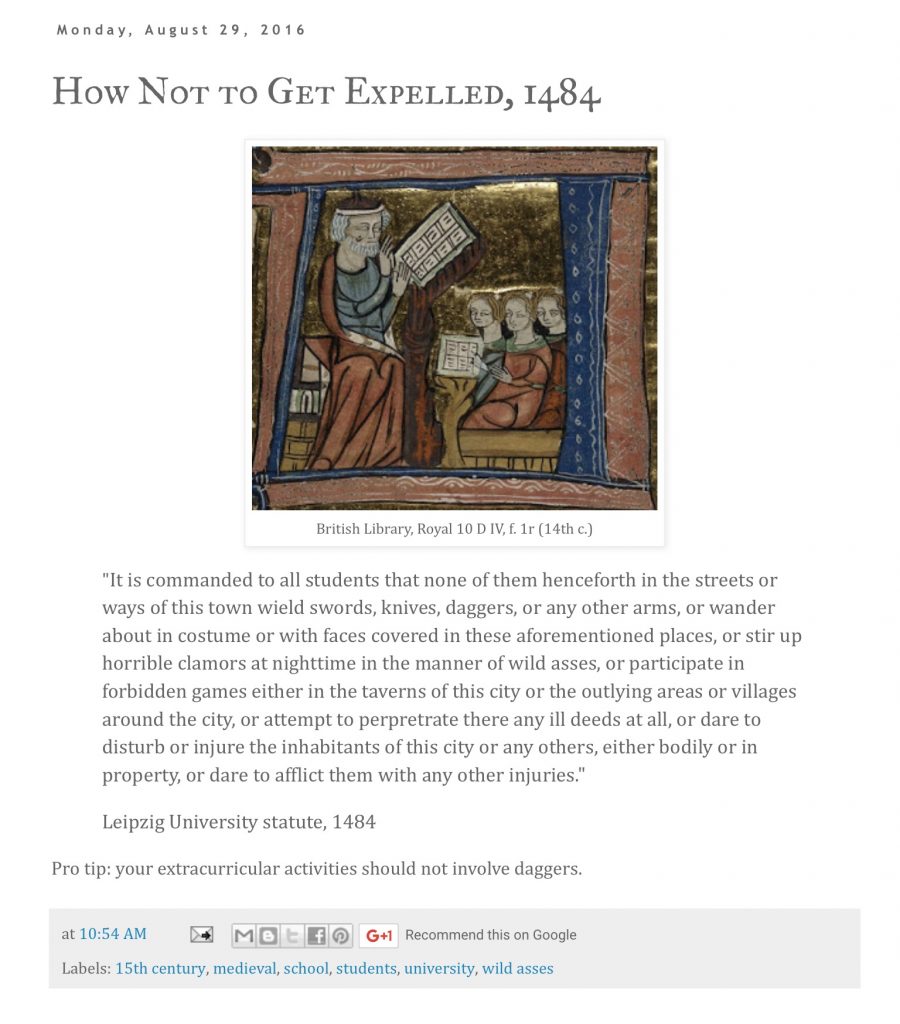 Source: Ask the Past
Source: Ask the Past

There is one very last thing, last but not least, the one rule that rules them all and in the darkness binds them. Remember that your instructors love you. We love everything and everyone that’s part of the great scholarly adventure that is university, and that includes teaching and includes you. We are here because we are curious and constantly marvelling; we find students wonderful and we care about you, about your intellectual development and about you as fellow human beings.
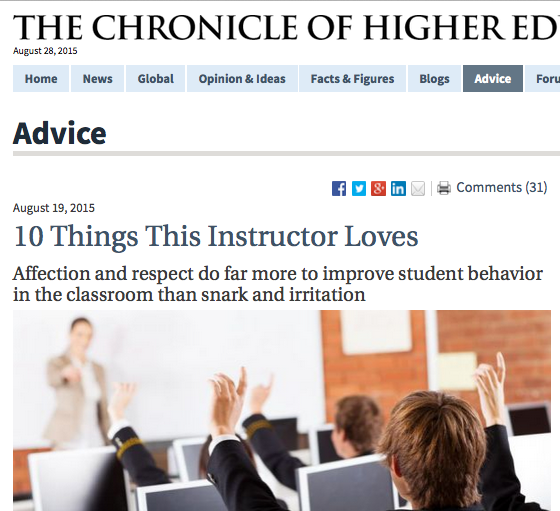
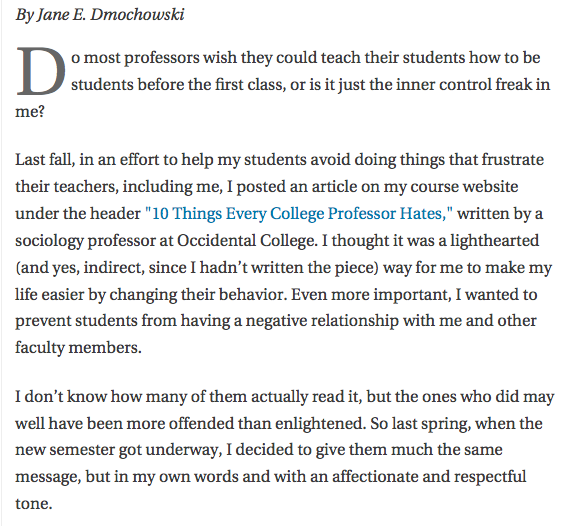
Jane E. Dmochowski, « 10 Things This Instructor Loves » (The Chronicle of Higher Education, 2015-08-19): click here to read on, including full details of these « 10 Things » …
HELP

If in doubt, if you have any questions or worries about anything, please ask!
- this course, your class, and your instructor are a safe space and here to help
- if I don’t know an answer—I’m merely human—I’ll help you to find someone who does
- this is a community of care
Email:
Office hours:
- My office is in Buchanan Tower, on the 7th floor (!), no. 728
- My office hours are on Monday from 4:00 – 6:00 p.m. and Tuesday from 1:00 – 6:00 p.m.

(sample human resource)
I’m often also there on other days and at other times, so if the door is ajar or open please come in. (Also, I have dark chocolate.)
If you can’t make it then and wish to make an appointment to see me, please email me so that we can figure out a mutually-convenient time.
I’m sharing some general useful resources below: openly-accessible freely-available information from the University. I use these resources a lot in the advising side of my work, you might also find them helpful, and they could also help you to help someone else. There are many people here at UBC who can help; even if it is « just » talking to someone with whom you feel comfortable and whom you trust, who will listen to you, that alone is already a vital service.
The same goes for any need to talk and to find support, whether something has happened to you or to someone you know, and also if nothing has happened but you worry that it might. Even if sometimes this seems like an overwhelmingly large university, and impersonal through its size and complexity: UBC is a compassionate caring community, made up of individual human beings.
QUICK NAVIGATION:
- In immediate proximity + your AMS
- UBC Academic advising
- UBC Student support, including how to help other students
- Stress, anxiety, sleep, well-being, exam preparation
- Safety, accidents, emergencies
IN IMMEDIATE PROXIMITY + YOUR AMS
Undergraduate residential advisers, and other student leaders who have had bystander & ally training
Neighbours, friends, and classmates
Faculty and other instructors (graduate-student teaching assistants, for example): you see us a lot, and we are here for you
YOUR AMS
- Speakeasy: AMS Nest 1314
Tue: 12.00-13.00 & 15.30-16.30
Wed: 11:00-17.00
Thu: 12:00-13:00
+ by appointment - Sexual Assault Support Centre: offer crisis and emotional support: AMS Nest 3127
Monday-Friday 10:00-5:00
(From 11 October: Monday-Sunday 8:00 a.m. – 10:00 p.m.) - Resource groups: Colour Connected, Pride, Social Justice Centre, Women’s Centre

ACADEMIC ADVISING
Through talking with them about academic matters during your time here, you may have already formed relationships with individuals with whom you would consider talking about other matters.
Academic advising at the departmental level may be another set of people to talk to, and again as with advising at the Faculty or School level, this is not just about a narrow sense of immediately academic matters: for example, here are the Academic Advisers in French, Hispanic & Italian Studies; students regularly talk to us about many things, all of which (and pastoral care) form part of any individual’s whole well-being.
UBC FACULTY OF ARTS
- Arts Student Support: students.arts.ubc.ca/student-support
- Arts Academic Advising: students.arts.ubc.ca/advising
Buchanan D111
Monday – Friday 9:00 am to 4:00 pm
(usually afternoon (1-4 p.m.) = drop-in, extended hours at the beginning of term, further details follow below)
Closed weekends and statutory holidaysThe Arts Academic Advising Office provides drop-in advising, Monday to Friday (1-4pm) in Buchanan D-111, answers brief questions via email or you can ask a quick general question on the Arts Facebook page.
 Email: Please include your student number
Email: Please include your student number
Domestic Students – arts.advisor@ubc.ca
International Students – arts.international@ubc.ca
Aboriginal Students – arts.aboriginal@ubc.ca
Phone: 604.822.4028 *For current UBC students

IF YOU ARE NOT IN THE FACULTY OF ARTS…
- Academic advising for all Faculties and Schools (not just the Faculty of Arts)
STUDENT SUPPORT
LOOK AFTER ONE ANOTHER
ARTS & UBC STUDENT SUPPORT
- Arts Student Support: students.arts.ubc.ca/student-support
- UBC Student Services: students.ubc.ca
- UBC Wellness Services
Barber Learning Centre 183
Monday, Wednesday, Thursday, & Friday 10:00-5:00
Tuesday 10:00-4:00
ACCESS & DIVERSITY
- Access & Diversity: students.ubc.ca/about/access
- Brock Hall 1203
- Email : access.diversity@ubc.ca
- ‘Phone: 604.822.5844
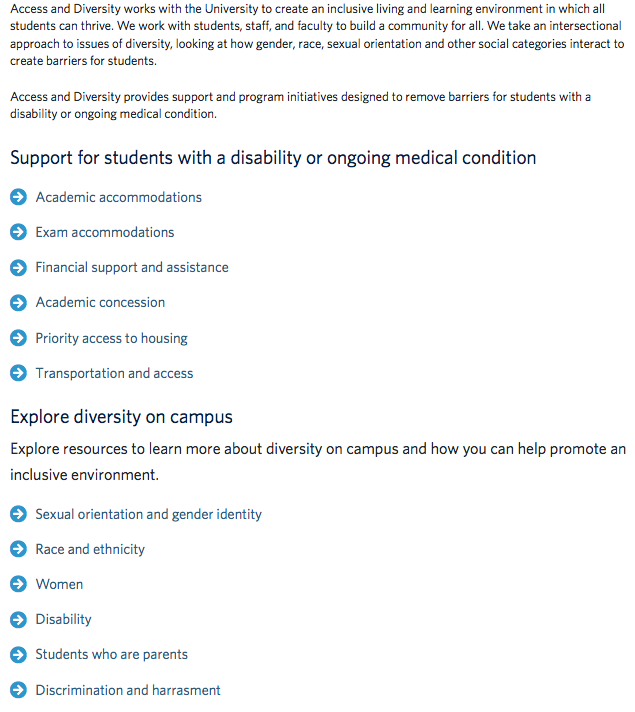
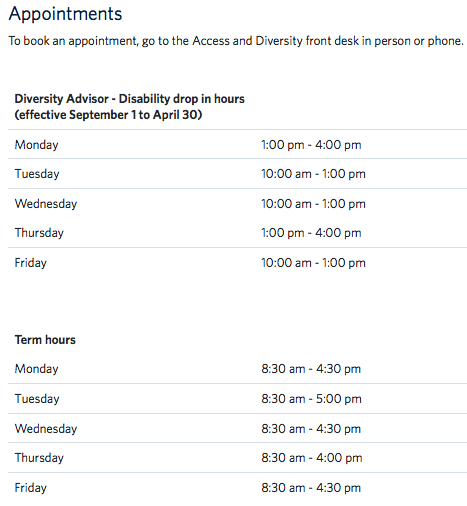
THE GREEN FOLDER
- The Green Folder : Student services > Assisting students in distress
= a very useful resource for faculty and for students, as everyone plays a role in supporting student wellbeing: we are all one community - Step 1: Observe
- Steps 2 and 3: Reflect and respond
- Step 4: Use Early Alert
- Talking to a student in distress
- Where students can go for help
- Encouraging a student to seek support

- downloadable PDF
- Student Services – Faculty & Staff Resources > Early Alert
= a one-stop shop for help, that brings together all of UBC’s support services under one virtual roof. Faculty and other instructors may use this to refer you for help and expert advice. (We’re all fabulous but we’re not superhuman: yes, there are limits to academic faculty expertise and abilities!) - Early Alert > Information for students
- The faculty version, FYI: because all this information is open to all, and it’s always good to see all perspectives in order to understand something better
AND HERE’S EVEN MORE UBC SUPPORT, SERVICES, RESOURCES …
- Resources for students c/o UBC Student Services have information and offer help:
Academic matters
Accommodation for disability
Career
Discrimination and harassment
Fair treatment
Financial concerns
Health
International student matters
Legal advice
Mental and physical wellbeing
Personal safety and security
Sexualised violence
Student-led programs
Wellbeing - the Office of the Ombudsperson for Students
→ their overview
→ fairness info sheet, fairness toolkits & other resources
→ their FAQs
STRESS, ANXIETY, SLEEP, WELL-BEING, EXAM PREPARATION
UBC resources for stress-relief for students
- Stress: http://students.ubc.ca/livewell/topics/stress
- Anxiety: http://students.ubc.ca/livewell/topics/anxiety
- Sleep: http://students.ubc.ca/livewell/topics/sleep (I cannot over-emphasise the importance of sleep, for general health as well as for brains & exams; UBC and research colleagues in psychology and neuroscience do too. It’s not just me.)
- Nutrition: http://students.ubc.ca/livewell/topics/nutrition-and-food
- Physical activity and recreation: http://students.ubc.ca/livewell/topics/physical-activity-and-recreation
Including events on campus:
UBC links:
- UBC Learning Commons: in the main menu, see especially the pages in
“(tutoring and) studying” and
“student toolkits” - exam preparation (via UBC CTLT), see especially:
- learning & memory (UBC Learning Commons)
- exam preparation & writing (SFU)
- overcoming exam anxiety (SFU)
SAFETY, ACCIDENTS, EMERGENCIES
- Student Services > assisting students in distress
- UBC Green Folder, for assisting students in distress
- 604.822.2222 = UBC Campus Security
- 604.822.4444 = Campus First Aid
- 911 = emergency services (ambulance, fire, police): on the UBC campus, call UBC Campus Security first (for practical reasons: the fastest response)
Images: by the Belgian artist Jean-Michel Folon (1934-2005). For more of his works, see the Fondation Folon and Folon-art.
TEXTES
TEXTES REQUIS
René Goscinny & Albert Uderzo
Astérix chez les Belges
ISBN: 9782012101562
Hergé
Tintin au pays des Soviets
ISBN: 9782203003033
Franquin
Capturez un Marsupilami
ISBN: 9782912536457
LECTURES SUPPLÉMENTAIRES, CRITIQUE LITTÉRAIRE, SOURCES SECONDAIRES – QUELQUES SUGGESTIONS
Michel de Certeau, L’invention du quotidien : 1. arts de faire (Paris: UGE, 1980 & Gallimard, 1990)
Will Eisner, Comics and Sequential Art (New York: Norton, 1985 & 2008)
—, Graphic Storytelling and Visual Narrative (New York: Norton, 2008)
Thierry Groensteen, La bande dessinée : une littérature graphique (Milan: Toulouse, 2005)
—, Un objet culturel non identifié (Mouthiers-sur-Boëme: Actes Sud – L’An 2, 2006)
—, La bande dessinée mode d’emploi (Paris: Les Impressions nouvelles, 2007)
—, Le petit catalogue du Musée de la bande dessinée (Paris: Flammarion, 2009) [= le musée du CNBDI à Angoulême]
—, Parodies : la bande dessinée au second degré (Paris: Flammarion, 2010)
—, Système de la bande dessinée (Paris: Presses universitaires de France, 1999 & 2011)
—, Bande dessinée et narration. Système de la bande dessinée 2 (Paris: Presses universitaires de France, 2011)
René Magritte, Les Mots et les images (Labor: Bruxelles, 1994)
Scott McCloud, Understanding Comics (New York: Harper, 1993)
—, Reinventing Comics (New York: Harper, 2000)
—, Making Comics (New York: Harper, 2006)
Benoît Peeters, La Bande dessinée (Paris: Flammarion, 1993)
—, Lire la bande dessinée (Bruxelles et Paris: Casterman, 1998)
—, Écrire l’image : un itinéraire (Paris: Les Impressions nouvelles, 2009)
Alain Rey, Les spectres de la bande : essai sur la B.D. (Paris: Minuit, 1978)
Nick Sousanis, Le déploiement (Paris: Actes Sud, 2016); traduction de Unflattening (Cambridge, MA: Harvard University Press, 2015)
EN LIGNE
Wikipédia
> Portail de la bande dessinée
> Portail de la bande dessinée francophone
Centre national de la bande dessinée et de l’image (CNBDI) (Angoulême, France) : beaucoup de ressources, fiches, informations, actualités, …
Festival international de la bande dessinée d’Angoulême
> historique
Centre belge de la bande dessinée (Bruxelles, Belgique) > section pédagogique
> Dossier : l’invention de la bande dessinée
> Dossier : l’art de la BD
> Quelques liens BD
Parmi une multitude de sites consacrés à la BD, le CBBD vous suggère de découvrir ce que recouvrent ces liens. Ils sont hautement recommandables pour tout savoir de la BD, de ses héros, de ses auteurs, de leurs éditeurs, de l’actualité, de la grande et de la petite histoire de la BD.
- www.actuabd.com
- www.auracan.com
- www.bdparadisio.com
- www.bdoubliees.com
- www.brusselsbdtour.com
- www.criabd.be
- www.kaboombd.tv
Les sites BD permanents en Europe :
- Pays-Bas, Groningen: www.stripmuseumgroningen.nl
- France, Angoulême: www.citebd.org
- Italie, Milan: www.museowow.it
- Suède, Stockholm: www.kulturhuset.stockholm.se
- Finlande, Helsinki: www.sarjakuvaseura.fi
- Portugal, Amadora: www.amadorabd.com
- Autriche, Krems: www.karikaturmuseum.at
- Suisse, Bâle: www.cartoonmuseum.ch
Mais aussi ces adresses bruxelloises :
- La Maison Autrique, mise en scène par Schuiten et Peeters: www.autrique.be
- La Maison de la BD/Musée Jijé: www.jije.org
- La Fondation Raymond Leblanc: www.fondationrleblanc.be
- Le musée de la figurine BD: www.moof-museum.be
- Le site de la Fondation Marc Sleen: www.marc-sleen.be
INDIRECT, EN DIVAGANT ET DIGRESSANT…
Agamben, Auerbach, Bachelard, Barthes, Benjamin, Bourdieu, Cixous, Deleuze, Derrida, Eagleton, Eco, Foucault, Genette, Irigaray, Iser, Jakobson, Jauss, Kristeva, Latour, Mitchell, Richard, Saussure, Serres
SUJETS DE RÉFLECTION, EN MARGE…
Le dessin animé
Le jeu de société, jeu d’ordinateur, jeu électronique interactif
Les bibliothèques et librairies spécialistes ; la culture et le « culte »
GLOSSAIRES
Voici quelques glossaires spécifiquement pour la bande dessinée.
- La Cité internationale de la bande dessinée et de l’image > glossaire bande dessinée
- La Cité internationale de la bande dessinée et de l’image > dossiers thématiques
Voir aussi :
- La terminologie de l’analyse et de la critique littéraire : FREN 336 > le commentaire
- Comment analyser un sujet, comment rédiger (en général) ?
Robert Besson, Guide pratique de la communication écrite, ch. 4: “Comment traiter un sujet.” Paris: Castella, 1987. - Fiches de méthode: voir les rubriques « le commentaire de texte » et « étude du texte littéraire » (etudes-litteraires.com) ; dont vous retrouverez une sélecion ci-dessous
- Vocabulaire pour l’analyse littéraire (etudes-litteraires.com)
- Les figures de style: liste par types: ex. figures d’amplification (etudes-litteraires.com)
- Les figures de style: liste alphabétique avec une petite description pour chaque figure, ex. la métaphore (etudes-litteraires.com)
- Tableau alphabétique des principaux figures de style: synoptique (etudes-litteraires.com)
- Comment analyser un sujet, comment rédiger (en général) ?
- FREN 336 > bibliographie
DICTIONNAIRES & GUIDES DE STYLE
LES DICTIONNAIRES
- Il est fortement conseillé d’avoir:
- ***Le Petit Robert ou Le Petit Larousse***
- et, éventuellement, un bon dictionnaire bilingue (bon = grand + gros: pas les versions concise, pocket, etc.): Oxford-Hachette ou Collins-Robert Senior. Tous les deux sont dans la bibliothèque de UBC et existent aussi en versions CD-ROM et en ligne (de même pour le Petit Larousse et le Petit Robert)
- Profitez de notre bonne fortune: nous avons les grands dictionnaires en ligne, grâce à la Bibliothèque de UBC: utilisez-les!
- Dictionnaires & textes en ligne
- + wordreference.com et ses fora
- + synonymes.com
- Dictionnaires français gratuits et en ligne ou à la bibliothèque (informations en anglais)
GUIDES DE STYLE / DE COMPOSITION
Vous trouverez un grand choix de livres aux mêmes sujets en français en bibliothèque et en librairie, mais malheureusement assez peu de matériel en ligne. La plupart de ce dernier s’adresse surtout aux professeurs de lycée et aux étudiants qui préparent le bac. Je vous en ai mis quelques-uns parmi les meilleurs sites, c’est à dire les plus clairs, cohérents, courts, compréhensifs, et denses.
- les Dix commandements de Dacre (O’Brien c/o Pattenden; en anglais)
- Guide stylistique (Direction des services acadiens et de langue française et le CPRP)
- Les grands classiques:
Bescherelle. Conjugaison
—. Grammaire
Grevisse. Nouvelle grammaire française
—. Le Bon usage - FRALICA : le français en liberté cadrée (site belge visé aux professeurs de lycée, avec quelques ressources utilisables…)
LA CITATION ET LE PLAGIAT
- (en anglais ; surtout pour les liens aux guides de style MLA, Chicago, etc. pour les formalités dans la citation) Meta-meta-medieval: « On reading, writing, & commentary » (O’Brien 2016)
- (en anglais ; comment bien citer tout en évitant le plagiat) Meta-meta-medieval: « On reading, writing, & commentary » > on plagiarism (O’Brien 2016)
les présentations
20 % de la note = une présentation :
- groupes de +/- quatre
- sujet : un album, une série, un dessinateur, un scénariste, un auteur, une maison d’édition, un journal / magazine / hebdomadaire, un thème/motif
- limites :
- en français
- OU disponible en traduction en français ET ayant une influence importante sur la BD francophone
- p. ex. Astérix chez les Belges, Tintin au pays des Soviets, ou Capturez un Marsupilami
- durée : environ 5 minutes (10 minutes maximum) par personne
LE COMMENTAIRE
10% de la note = un des travaux pour ce cours sera un commentaire, où vous choisirez une planche d’une BD (ou juste une seule case) et vous expliquerez votre choix et la valeur de cette planche (ou case).
- sujet : une planche / page OU une case
- qui se trouve dans une BD en français
- vous pourriez utiliser une des BD au programme pour ce cours
- … ou un autre album dans la même série (Astérix, Tintin, Marsupilami)
- … ou dans une autre série par le même scénariste, dessinateur, ou auteur (ex. Goscinny / Lucky Luke, Franquin / Gaston Lagaffe)
- … ou une autre BD, pourvu qu’elle soit en français (y compris en traduction française, p. ex. Nick Sousanis, Unflattening / Le Déploiement)
- longueur : 500-750 mots ou équivalent (p. ex. une vidéo)
- date de remise : le 5 mars (par e-mail ; fin de journée, minuit) ou le 6 mars (en classe)
INTRODUCTION:
EN COMMENTAIRE SUR LE COMMENTAIRE,
UNE EXPLICATION DE L’EXPLICATION
Un commentaire d’image ou d’autre objet ressemble dans l’ensemble à un commentaire de texte :
- introduction et identification d’un QUOI préliminaire et superficiel :
- qu’est-ce que c’est que cette chose ?
par qui ? - (souvent aussi—mais pas toujours—et seulement s’il y a une pertinence pour les éléments que vous souhaitez souligner dans la partie principale de votre commentaire) une interrogation supplémentaire qui contextualise l’objet de votre analyse contexte :
pour qui a-t-elle été faite ?
de quand date-t-elle ?
où se trouve-t-elle ?
un contexte immédiat = le texte autour, p. ex. un livre ;
un contexte plus large = son milieu, un groupe ou mouvement (esthétique, intellectuel, social, politique), un lieu, une époque, une culture
- qu’est-ce que c’est que cette chose ?
- le QUOI et le POURQUOI en détail et en profondeur :
que fait cette chose ?
comment ?
pourquoi ?
et à quelle fin ?
= la partie principale (entre 2/3 et 4/5 du commentaire) - le déploiement de(s) POURQUOI(S) :
pourquoi devrait-on la lire ? quelle est sa valeur ?
pourquoi l’avez-vous choisi comme sujet de commentaire ?
reste-t-il des questions ouvertes à poser, des conclusions ou des suggestions pour un élargissement de l’analyse et de la discussion ?
(voir aussi : Roland Barthes)
- le QUOI et le POURQUOI en détail et en profondeur :
que fait cette chose ?
comment ?
pourquoi ?
et à quelle fin ?
= la partie principale (entre 2/3 et 4/5 du commentaire) - le déploiement de(s) POURQUOI(S) :
pourquoi devrait-on la lire ? quelle est sa valeur ?
pourquoi l’avez-vous choisi comme sujet de commentaire ?
reste-t-il des questions ouvertes à poser, des conclusions ou des suggestions pour un élargissement de l’analyse et de la discussion ?
(voir aussi : Roland Barthes)
Interroger, analyser, interpréter, juger : c’est surtout un travail / une approche CRITIQUE.
LE DROIT ET LA JUSTICE…
… ET L’ANALYSE ET LA CRITIQUE
Celles-ci sont liées au jugement: qui doit être équilibré (le bien vs. le mal). Vous mettez vos évidences et vos arguments/vos explications/votre raisonnement dans les plateaux de la balance de la justice, et puis vous les pesez. Notons surtout, depuis la fameuse Wikipédia:
La balance nécessitant l’utilisation de poids, elle obligea à réglementer le pesage avec le plus grand soin.
Voici l’étymologie de base (c/o Project Perseus):


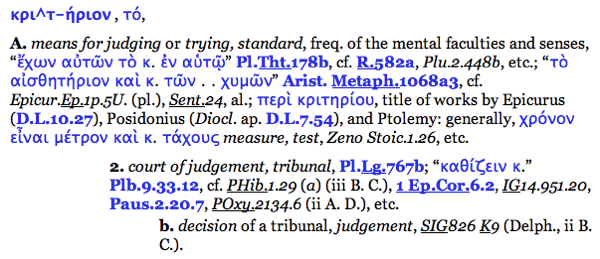
le critère (en anglais: « criterion », pl. « criteria »)
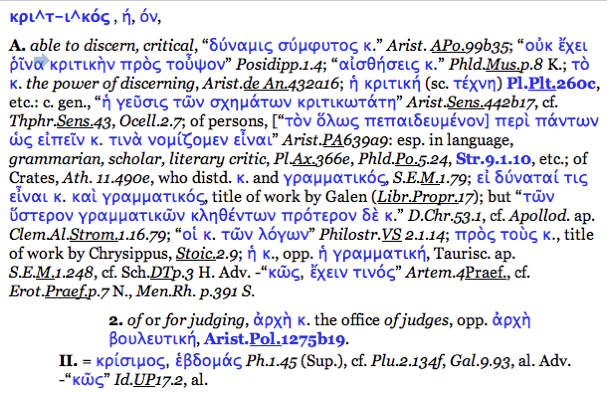
la critique / ce que fait un critique
oOo
QUOI ?
C’est un des types d’analyse littéraire.
Ce n’est pas un essai général / la « dissertation » française, mais un commentaire détaillé, et un exercice de bonne lecture. Une lecture minutieuse et l’étude approfondie de la citation ou du passage choisi, et de ses rapports intratextuels ; une mise en valeur de cette petite partie en relation à l’œuvre entière (roman, collection poétique, livre, album) dans laquelle elle se situe.
C’est surtout VOTRE LECTURE : une réaction et appréciation du texte par VOUS, le lecteur individuel – critique, interprète, et juge.
Le commentaire est un des modes/genres d’écriture—et, à débattre, littéraires—les plus anciens, pratiquée partout dans le monde, pendant toutes les époques. Il fait partie d’une famille de formes littéraires ; ces formes ne sont pas identiques mais partagent des liens de parenté… :
- l’analyse et la critique textuelle
- l’exégèse : l’explication, la glose, et le commentaire classiques ; souvent philologiques ; en grec, latin, hébreux, arabe, etc. sur la Torah, la Bible, et le Koran; forme très ancienne d’écriture (y compris de l’Antiquité)
- l’herméneutique : l’interprétation classique
- le commentaire composé / le commentaire de texte / le commentaire littéraire
- l’explication de texte
- close reading
- practical criticism
- la microlecture, qui devient (redevient, retourne…) à la mode: voir par exemple
- Marc Escola, « Présentation : le vœu de myopie », Fabula LHT (Littérature, histoire, théorie) (1e septembre 2007) : http://www.fabula.org/lht/3/Presentation.html
- et ce qu’on a fait dans le séminaire de recherche en études françaises et francophones (UBC département de FHIS)
- et une définition de base, dans l’introduction de Sarah Tribout-Joseph, « Comment relier les microlectures? La longue lettre de Proust à sa mère », Australian Journal of French Studies (1e septembre 2010):
[…] une lecture détaillée […] « petites lectures? Lectures du petit? Les deux choses à la fois sans doute. »*[…] « Petite lectures »* implique plutôt la lecture des passages courts tandis que « lecture du petit »* suggère que le sujet peut s’étaler sur tout le texte. Le premier se rapproche plutôt du commentaire de texte (où il s’agit d’expliquer tout le passage ainsi que de le situer dans le texte); le deuxième se rapproche de l’étude thématique. Nous reviendrons sur cette distinction.
La microlecture n’a pas de méthodologie bien précise. Quoique parente des pratiques scolaires du commentaire de texte français et de son équivalent anglosaxon, le « practical criticism », la microlecture se refuse aux règles fixes d’usage. Ce qui importe, c’est de savoir s’arrêter dans sa lecture, de savoir relire un passage et dégager son fonctionnement. L’un des avantages de la méthode, c’est justement qu’elle ait cette flexibilité, qu’elle s’adapte au texte, que la méthode d’analyse soit dictée par le texte. La microlecture est avant tout un travail de relecture. C’est une manière de lire qui ne vise pas, en premier lieu, le texte dans son ensemble mais plutôt qui essaye d’approfondir la compréhension de certains passages. Comme le dit Richard,* c’est « un changement d’échelle. Elles [les microlectures] visent, dans l’oeuvre lue et commentée, des unités beaucoup moins vastes […] La lecture n’y est plus de l’ordre d’un parcours, ni d’un survol: elle relève plutôt d’une insistance, d’une lenteur, d’un voeu de myopie. Elle fait confiance au détail, ce grain du texte. »
* les citations sont de Jean-Pierre Richard, Microlectures (Paris: Le Seuil, 1979): l’ouvrage de base / de référence pour l’idée de la microlecture
oOo
POURQUOI ?
Pourquoi le faire ? ça sert à quoi ? quelle en est son utilité ?
C’est un exercice intellectuel qui est fortement basé sur l’annotation, et notons qu’on utilise le mot « glose » pour les deux:
« Annotation is often the underemphasized link between what we read and what we write. »
Charlie Wesley, « Mark it up, » dans la rubrique « Do your job better » du Chronicle of Higher Education (le 18 octobre 2012): voir le reste de l’article ainsi que les commentaire. L’article (ainsi que tout le reste de ce journal) est à l’intention des profs, mais fort révélateur… un peu comme l’est Rate My Professor pour les professeurs…
Ou bien, comme le dit Montaigne—soulignant l’importance et l’histoire du commentaire (la « glose » ici), en tant que forme littéraire et de créativité et de culture humaine—mais aussi avec un brin d’ironie voir même de malice, un clin d’œuil ludique avec vous le lecteur (en train d’interpréter, etc.):
Nous ne faisons que nous entregloser.
« De l’expérience, » Essais III.13 (Villey, p. 1069 mais regardez aussi surtout à partir de la p. 1066; le lien vous mène au paragraphe en entier, qui avait commencé à la p. 1065, au tout début de cet essai… Source : The Montaigne Project, c/o The ARTFL Project, Department of Romance Languages and Literatures, University of Chicago.)
oOo
COMMENT LE FAIRE ?
Vous pouvez y apporter toutes vos connaissances extra-curriculaires, d’autres lectures, des recherches, etc.—ils forment votre propre arrière-plan critique individuel—MAIS le bon endroit pour en discuter à votre aise, ce n’est pas l’explication mais plutôt la dissertation. Là, vous aurez de l’espace et du souffle pour le faire.
On vous signale SURTOUT qu’il est bien possible d’écrire une analyse critique brillante sans recours au matériel secondaire (articles et livres de critique). C’est effectivement précisément ce qu’on vous demande de faire !
Les limites à la liberté d’interprétation sont
❊ la POSSIBILITÉ (logique, sens des mots) et
❊ la VRAISEMBLANCE (donc, ni robots ni psychanalyse au 16e s.)
UN GUIDE RAPIDE POUR TOUTE ANALYSE …
- Comment analyser un sujet, comment rédiger (en général) ?
Robert Besson, Guide pratique de la communication écrite, ch. 4: “Comment traiter un sujet.” Paris: Castella, 1987.
QUELQUES RESSOURCES SUPPLÉMENTAIRES EN LIGNE
- Guides rapides:
- Méthode du commentaire composé: version rapide (études-littéraires.com)
- L’essentiel: cet extrait de Micheline Dufau et Ellen D’Alelio, Découverte du poème: Introduction à l’explication de textes (New York: Harcourt, Brace & World, 1967)
- L’analyse de texte (autre version rapide: Sharon P. Johnson, Virginia Polytechnic Institute and State University);
- L’explication de texte chez Tennessee Bob’s Famous French Links
- Guides approfondies, prolongées, plus complètes… :
- Le commentaire composé: version complète (études-littéraires.com)
- Le commentaire composé (Olivier Dautrey, Lyon)
- LE COMMENTAIRE: ce que c’est + une mise en pratique (O’Brien 2011 & 2012 ; une version pour le FREN 220 du « Comment écrire une analyse critique ? » ci-dessous)
- Comment écrire une analyse critique ? (O’Brien 2009, pour FREN 320 & FREN 420)
- On reading, writing, and commentary (O’Brien 2012 & 2016, pour MDVL 302 & 301A )
POUR LA PARTIE PRINCIPALE / LE DÉVELOPPEMENT de votre analyse:
- GLOSSAIRES : le vocabulaire technique et critique spécifique à la bande dessinée
- Fiches de méthode: voir les rubriques « le commentaire de texte » et « étude du texte littéraire » (etudes-litteraires.com) ; dont vous retrouverez une sélection ci-dessous
- Vocabulaire pour l’analyse littéraire (etudes-litteraires.com)
- Les figures de style: liste par types: ex. figures d’amplification (etudes-litteraires.com)
- Les figures de style: liste alphabétique avec une petite description pour chaque figure, ex. la métaphore (etudes-litteraires.com)
- Tableau alphabétique des principaux figures de style: synoptique (etudes-litteraires.com)
- un exemple de commentaire composé: Ronsard, « Comme on voit sur la branche… » (Espace Lettres 3); voir aussi dans la rubrique à gauche sur cette page-là, « le commentaire composé » & « méthodologie rédaction »
L’ÉCRITURE


